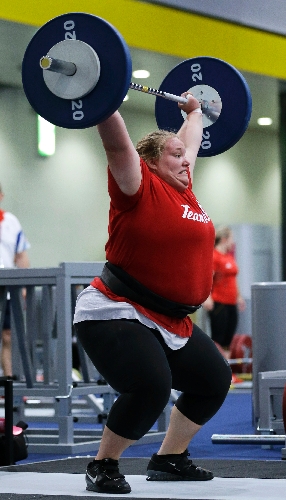Female lifter out to squash stereotypes


Picture this: Somewhere in Columbus, Ohio, there is a house, and in that house there is a laundry room, and in that laundry room there is a bed, and in that bed sleeps a 340-pound female weightlifter.
“At least,” Holley Mangold said, “my clothes are always clean.”
Go ahead. Let the stereotypes fly. She is manly. Obese. Competes in a man’s sport and one historically linked to the use of performance-enhancing drugs.
She’s not feminine enough. Her voice is too deep. She’s more guy than gal.
She has heard it all. Lived every cliche. Understands the snickers and stares and fat jokes.
She also is one of the most comfortable people in her skin you ever will meet. Hers is a viewpoint and realism that should be championed by young girls instead of ridiculed by adults who want to shape them in idealistic forms seen on runways and magazine covers.
There also is this: Mangold is brilliant, a triple major – theology, sociology and psychology – when she studied at Ursuline College in Pepper Pike, Ohio, before dropping out to train full time for the London Olympics.
“I like to read and write a lot,” said Mangold, who will return to school after the games. “And I’m strong enough to carry the books.”
Mangold has one of those made-it-before-her-time-stories, a 22-year-old who most thought wouldn’t qualify for an Olympics until 2016 in Rio de Janeiro, but who found a coach willing to guide her and a fire within willing to devote the work and sweat needed to qualify.
She competes in the super heavyweight class Sunday, and some think she might challenge for a bronze medal. Her personal best is 562.2 pounds in the combined snatch and clean-and-jerk.
Lulu Zhou of China is the world-record holder at 723 pounds.
Yep. The Chinese women rule this stuff, too.
Mangold is the younger sister of New York Jets center Nick Mangold and played football herself for 12 years. Small colleges recruited her, but by that time she had fallen in love with the weight room.
It takes five years to truly confirm whether someone can be a good weightlifter. It can take 10 to confirm someone is elite.
Mangold has been doing this for 3½.
It is good that she is here, that she can be interviewed and talk about her journey on a worldwide stage, that her story and opinions about women and their bodies and the unfair expectations put on them might reach all points of a universal map.
Her outlook on life as a large woman in a society obsessed with being thin is more impressive than any number of plates on a bar.
“Just because you compete in something outside the social norm doesn’t mean you forget you’re a woman,” she said. “I’m a super heavyweight for a reason. I don’t avoid food. I enjoy it. I embrace it.
“But my message to young girls would be, ‘Be who you are and not who society says you should be.’ I’ll see a small, pretty little girl, and she has no confidence whatsoever. It’s weird. I want to fix it.
“I love my body. I think it’s perfect. My personality wouldn’t be like this if I wasn’t huge. I also know that when I retire, I will drop a lot of weight and live a healthy lifestyle and not be as big. I’ll never be skinny, and I’m perfectly OK with that. You can be a large woman and be healthy.”
Picture this: An up-and-coming female weightlifter goes to a major competition and bombs out to the point she isn’t invited back to the Olympic training center in Colorado. Her place is taken by those thought by coaches more ready to make the U.S. team.
She returns home to Ohio and moves in with a training partner/coach (Drew Dillon), who offers his couch and later the laundry room in which to sleep. A fire is ignited. She trains like never before, dropping from 390 pounds to 300. Her lifts continue to climb and climb.
She makes the U.S. team.
“I would like to say I hope you find inspiration from my story,” Mangold said. “I hope you find inspiration to do something out of the norm – and it’s not just for women. It’s for men, women, children, old people, you know, everyone. The reason is, I want people to wake up every day and be happy with what they’re doing.”
And, most important, who they are.
Las Vegas Review-Journal sports columnist Ed Graney can be reached at egraney@reviewjournal or 702-383-4618. He can be heard from 11 a.m. to 2 p.m. Monday through Friday on “Gridlock,” ESPN 1100 and 98.9 FM. Follow him on Twitter: @edgraney.












